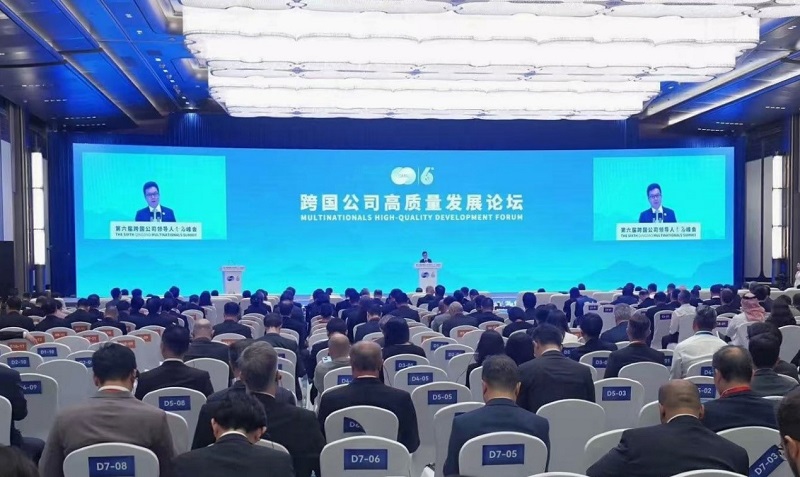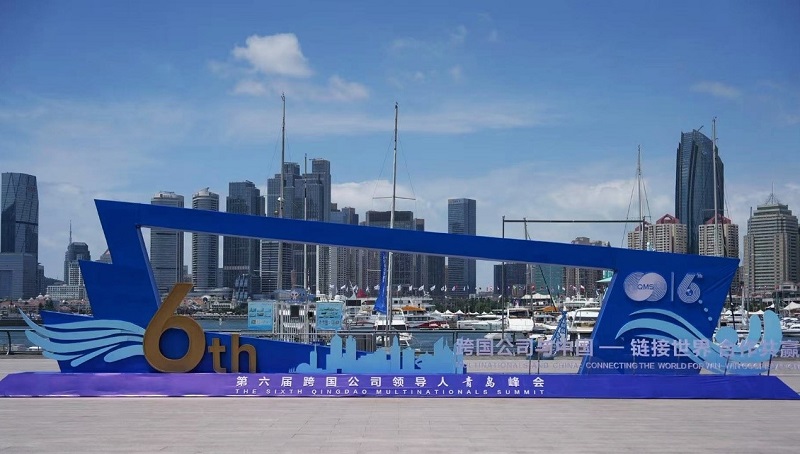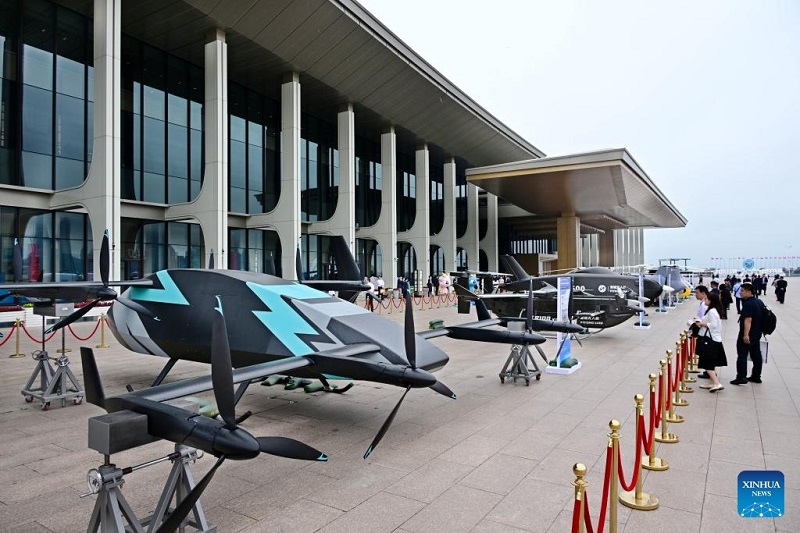China’s push for greater opening-up and its appeal for foreign business gain momentum despite global uncertainties.
In its 14th Five-Year Plan (2021–2025), China proposed to continue to place equal emphasis on bringing in foreign investments and going global. As China approaches the conclusion of this five-year plan, foreign investment remains a vital pillar in advancing the country’s high-standard opening-up and high-quality development.
This commitment was on full display from June 18 to 20, 2025, when 456 multinational corporations from 43 countries gathered in Qingdao, east China’s Shandong Province, for the sixth Qingdao Multinationals Summit. Amid rising global trade protectionism and geopolitical tensions, the summit sent out a clear message: foreign businesses still see China as a reliable and promising partner.
At the opening ceremony, Chinese Vice Premier He Lifeng emphasized that China’s super-large domestic market and the most complete industrial system in the world have demonstrated strong economic resilience and growth potential, underscoring why the country remains a magnet for global investment throughout the period of the 14th Five-Year Plan.

The Multinationals High-Quality Development Forum is held on June 19, 2025, as part of the sixth Qingdao Multinationals Summit in Qingdao, east China’s Shandong Province.
A Vote of Confidence
According to the Report on the Development of Multinational Corporations in China (2025) released at the summit, multinational corporations have made substantial investments in China this year, showing that the Chinese market continues to exhibit significant appeal to foreign investors.
“Over 15 percent of multinational corporations have invested RMB 10 billion or more in China. Notably, Samsung Electronics, Hyundai Motor, and BASF rank as the top three investors among all multinational corporations, with investments exceeding RMB 30 billion,” the report noted.
Recent official data echo this trend. On June 20, 2025, China’s Ministry of Commerce said that in the first five months of 2025, 24,018 new foreign-invested enterprises were established on the Chinese mainland, representing a year-on-year growth of 10.4 percent.
Several business leaders highlighted why they remain bullish on the Chinese market. Jens Eskelund, president of the European Union Chamber of Commerce in China, indicated that China possesses advanced technology, a vibrant innovation ecosystem, and a large labor force, which is why many European companies choose to set up R&D centers in the country. He noted that the two sides have numerous opportunities for cooperation in areas such as technological innovation, decarbonization, and the digital economy. Eskelund expressed hope that China and the EU will engage in more dialogues to explore cooperation, address challenges, and better achieve mutually beneficial outcomes.
Senthil Kumar, vice president of service and repair of National Oilwell Varco in Asia and Middle Eastern & Northern Africa, believed that China offers many favorable conditions for foreign companies. He told China Today that their local employees’ dedication and the “gung-ho spirit” of local businesses greatly enhance productivity and collaboration. He also noted that China’s competitive cost structure and ongoing technological advancements allow businesses to achieve more with less, making it an ideal environment for scaling operations.
Stephan Dyckerhoff, president of Buurtzorg Asia, a Dutch home healthcare organization, told China Today that China’s elderly care market holds significant opportunities due to its massive unmet need for elderly care, coupled with the government’s elderly care strategy, which prioritizes home and community-based care, the core of Buurtzorg’s model.

A theme display board of the sixth Qingdao Multinationals Summit is seen in Qingdao, east China’s Shandong Province on June 20, 2025.
Government Backing
Multinationals’ sustained confidence is underpinned by consistent government support. In line with the 14th Five-Year Plan’s call for greater efforts to attract and utilize foreign investment, China has introduced a series of reform measures to facilitate market access and improve the business environment over the years.
In the latest move in February, China issued the 2025 Action Plan for Stabilizing Foreign Investment, outlining 20 measures to attract and stabilize foreign investment. They include expanding pilot programs to open up the telecommunications, healthcare, and education sectors, removing restrictions on foreign investment companies’ access to domestic loans, and streamlining procedures for cross-border personnel exchange.
Local governments are also playing a proactive role. Take Qingdao as an example. According to a local official, Qingdao has introduced 24 new measures to further attract foreign investment. The city has established a regular communication mechanism to provide optimal services for enterprises, including a roundtable system for foreign-invested enterprises and customized, on-demand government services.
Tony Pusic, senior vice-president of global operations at AstraZeneca, a British pharmaceutical giant, credited the Qingdao municipal government’s efficiency for the company’s rapid progress in building a manufacturing base in China. “We reached key milestones within just 30 days – from land acquisition to groundbreaking – demonstrating the remarkable ‘Qingdao speed,’” he said.
Similarly, Alain Lefranc, vice president at Atlas Copco, Greater China, said that the company’s remarkable growth over the past decade has been driven by the continued collaboration with the Qingdao government, leading to the establishment of an integrated manufacturing base supported by the region’s robust supply chain and talent pool.
At the summit, He Lifeng reiterated China’s commitment to greater support, saying China will steadfastly advance its high-level opening-up, create a world-class business environment, and firmly uphold the multilateral trading system. “We welcome multinationals and entrepreneurs from around the world to invest and do business in China, to share opportunities, pursue common development, and create a better future together.”

People visit the outdoor exhibition venue of the sixth Qingdao Multinationals Summit in Qingdao, east China’s Shandong Province, on June 19, 2025. (Xinhua)
Rising Above Global Headwinds
The 14th Five-Year Plan period has been marked by significant shifts in the global economic landscape, including rising trade barriers and geopolitical tensions. Yet, China has remained a stabilizing force and a champion of win-win cooperation.
Mohammed Saqib, secretary-general of the CHIMENA Business Council, told China Today that India once put restrictions on Chinese investment, trade, and products, but that hurt Indian industries more. He believed that the U.S. tariffs are hurting American industries too. He predicted that tariffs imposed on China would prove temporary, citing recent dialogue between Chinese and U.S. officials in London. “I think these non-tariff barriers or tariff barriers are not going to sustain with China,” he said.
Yoon Doson, vice president of CJ Group, echoed this sentiment: “Against the backdrop of a complex and evolving global economic landscape, many multinational giants continue to increase their investment in China, demonstrating their trust in the country and confidence in its development potential.”
During the 14th Five-Year Plan period, foreign companies’ continued engagement reflects not only confidence in China’s resilient economy but also a recognition of the unique and diverse opportunities it offers. With the upcoming 15th Five-Year Plan expected to prioritize areas such as new quality productive forces and green development, foreign expertise and capital will play an even more crucial role.
As Chinese President Xi Jinping emphasized to representatives of the international business community in March, “Embracing China is embracing opportunities, believing in China is believing in a better tomorrow, and investing in China is investing in the future.”